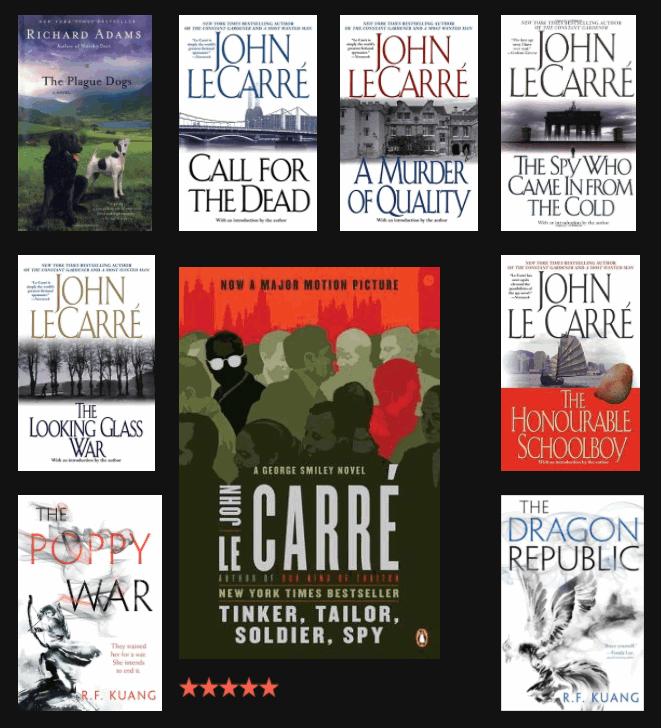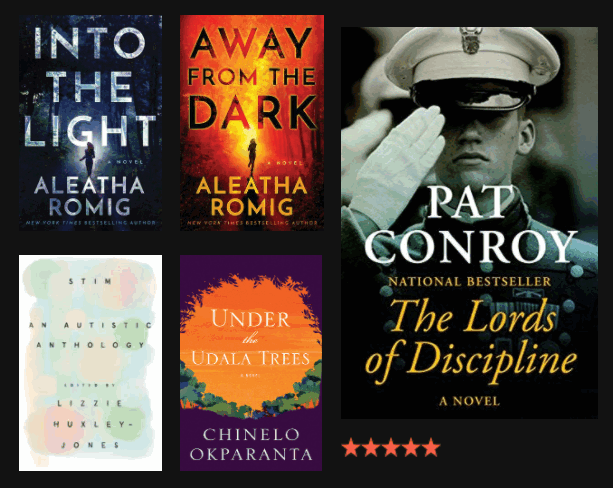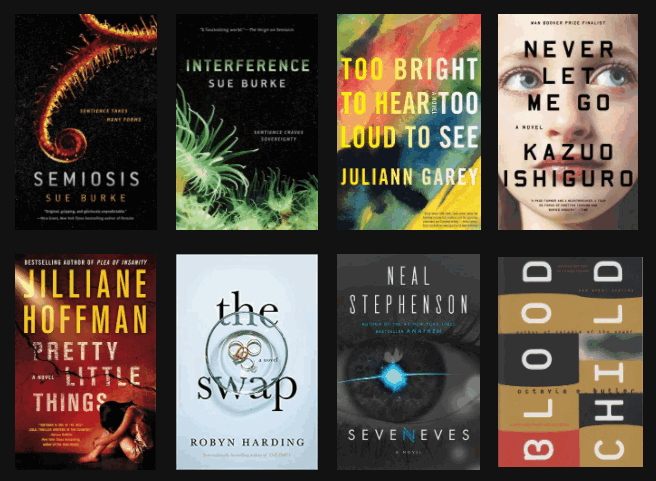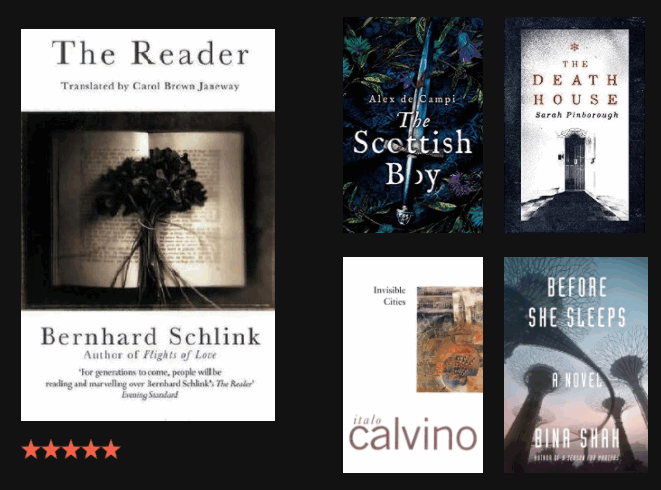I managed to read 26 books in 2020. That’s 6 more than last year and more than twice as many as in 2017. I dare say I’m moving up in the world! As usual, it was a mixed bag: most were good, a few were bad, and one or two were amazing. Here’s the list with short reviews:
I entered the year reading THE PLAGUE DOGS by R. Adams. The same guy who wrote the beloved Watership Down, which is, in my mind, all hope and sunshine despite some dark themes–created this devastating, deeply depressing story of human ignorance and cruelty as seen through the eyes of hunted and abused animals. The book ends on a suspiciously positive note; like someone else wrote the ending, or it was stolen from a completely different work. Later I learned that Adams was talked into writing it that way in spite of his own intentions, which were rather to deliver on the promise of tragedy. At times difficult to read due to the stubborn transcription of some local English dialect, this was as heavy as it was awesome.
Next I launched into a project to re-read all the spy novels of J. le Carre, which I remember fondly from my teenage years. Contrary to intuition, these seemed to decline in quality, with earlier ones being generally the better. CALL FOR THE DEAD is brief, tense and cerebral, introducing the soft-spoken, bespectacled George Smiley as the favorite protagonist whose absence alone, I feel, doomed some of the later books to mediocrity. This book is likely the best entry point for a reader new to Le Carre. A MURDER OF QUALITY mostly has the same traits but is fairly more sedate as Smiley never really gets a piece of the action himself. Both these novels are essentially murder mysteries with only a side of spy stuff.
THE SPY WHO CAME IN FROM THE COLD is the first book centered squarely on that. Moderately complex and fairly linear, it’s easy to read and follow. The main character, Leamas, never quite achieves the level of connection/attachment reserved for Smiley, but isn’t as far off the mark as those in some of the later works. A suspenseful tale with some excellent twists and a tragic ending that you can see coming but keep hoping to avoid, just like the characters themselves.

THE LOOKING GLASS WAR was, on the other side, rather tedious and at times even outright boring. I found it impossible to relate to any of the characters in any way; they were all too ordinary, petty, conceited, with none of Smiley’s quiet charm and wit or Leamas’ unwavering courage. No doubt this was on purpose. It’s a story about incompetent people biting off more than they can chew that ends in embarrassment, failure and some pathetically non-heroic deaths. As such, it’s an interesting experiment; but it didn’t make for a fun read. No wonder I have no memory of this book from before.
However, the next book in the series, THINKER, TAILOR, SOLDIER, SPY, was the absolute best of the bunch. If you’re familiar with my fanfiction and find the title suspiciously similar to the title of my Mass Effect novel, Thinker Traitor Soldier Spectre, it’s no coincidence. While I can’t say my work was directly inspired by this book, it was, and remains, an example of what I aspire to achieve some day in terms of plot complexity and character depth. I enjoyed it immensely, but if I’m completely honest, I think the enjoyment was intensified quite a bit by watching the movie adaptation a few months ahead of reading the book. The movie helped me visualize some characters and situations and spelled out some truths that perhaps wouldn’t be obvious from the text alone. Another thing that enhanced my impressions is that this book has actual gay content that I’ve completely forgotten about, or perhaps missed on my first reading. It’s subtle enough; perhaps even more subtle in the movie. But it’s there, and as usual, it makes everything better. I don’t know if I’d recommend this book to someone new to this genre or author, but I definitely recommend the movie. It’s a hugely successful adaptation. The only objection I had was that Smiley wasn’t nearly as fat or fluffy in the movie as I imagined him.
I didn’t finish the series. Perhaps I’ll try to go on this year. The last book I read, THE HONORABLE SCHOOLBOY, was another exercise in tedium, featuring another main character I couldn’t relate to at all, a hopelessly tangled and meandering plot, and not enough Smiley content.
As a respite from spy themes, I picked up the first two books in THE POPPY WAR series by R. F. Kuang. Kuang is an author I’ve been following on social media, one very young for the kind of success and praise she has been enjoying, and I wanted to see for myself if her work is worth it. But even after reading these books, it’s hard to say. The premise is fresh enough, I suppose: like Harry Potter, on drugs, in medieval China, with a sprinkling of dark themes and generously inspired by historical events. The writing is competent but by no means awesome, the characters unique and varied but prone to random stupidity, and the overarching story tiptoes at the verge of plausibility. I had no problem returning to the books to keep reading them, but part of my interest came from a morbid fascination with just how much I disliked the main character and everything she did. The third and final book of the series appeared in press a couple months after I finished the first two, or I would have read that too, no doubt. I remain divided.

Next came a two-book series by A. Roamig: INTO THE LIGHT and AWAY FROM THE DARK. These were in a different tier from the rest. I’m not sure if they’re traditionally published or self-published but the latter wouldn’t surprise me, as they had that intangible but clearly discernible vibe of fanfiction. The first book features a unique twist, wherein the true identities of both main characters remain skillfully disguised until past the half-mark. If not for the gratuitous sex and humiliation of women, I’d say the series was a decent read.
STIM – AN AUTISTIC ANTHOLOGY by L. Huxley-Jones I’ve already reviewed here. After that I read UNDER THE UDALA TREES, a moving story about a lesbian woman growing up and finding her way through the maze of adult life in Nigeria. Very intimate, sincere and humane, it drove me to dread and joy more than a few times.
P. Conroy’s THE LORDS OF DISCIPLINE is one of the best books on my 2020 list. It’s about a young man and his small band of friends, getting through the rigors of a military academy where bullying and hazing are officially recognized as acceptable methods of producing “real men”. I enjoyed this book on several levels. It tells a rock-solid tale that’s easy to get into and stay interested in; it sports believable, completely fleshed-out characters I grew to care for very quickly; two shocking twists; and beautiful, poetic language that was music to my ears. Not enough of the books I read have language embellished enough for me to take note and appreciate. This was refreshing and inspiring despite the heavy themes.

After this I picked up SEMIOSIS and INTERFERENCE by S. Burke; the first straight-out science fiction I’ve read in a long while, and as my luck with reading would have it, excellent. I praised these in a full review that you can find here.
TOO BRIGHT TO HEAR, TOO LOUD TO HEAR by J. Garey left mixed impressions and my memory of it is already a bit vague. I found it believable and relatable enough, and appreciated what felt like personal and sincere insights into mental illness, but it was by no means a page-turner and I was glad to put it down for good when I finished it.
NEVER LET ME GO by K. Ishiguro was another of last year’s favorites. I blogged about it after seeing the movie adaptation, but I feel like that post didn’t do justice to how much I loved the book. It’s a unique tale told in a unique way; like a transcript of a life story remembered and narrated on the spot, with no premeditation–and yet the plot and pacing are flawless. I’m looking forward to reading more fiction from the pen of the same author.
J. Hoffman’s PRETTY LITTLE THINGS is a crime investigation story that felt just a tiny bit too gory to be true (though I actually have no doubt worse can and does happen in real life). The author, a former judge, is obviously well-versed in the workings and procedures of the American legal apparatus, but one bad internet reference, somehow uncaught by the publishing gatekeepers, made the entire book sound desperately outdated and even slightly comical. A rather forgettable read.
I suspect I’d judge THE SWAP by R. Harding about the same if not for its special status as my first ever audio book. I read–well, listened–to it while doing some mindless practice for Rocket League that didn’t interfere with my concentration and found that the experience isn’t too different from actual reading; perhaps it’s even enhanced by the talent of the actors. Despite the mundane plot, the book managed to hold my interest thanks to some well-executed stereotype inversions. The student is more mature than the teacher; the tiny wife abuses the burly husband; an almost accidental killing turns into a perfect crime. And last but not least, the humorless main character, who is arguably the most deviant of the bunch, remains effortlessly sympathetic throughout without the help of anything saccharine. All in all, not bad.
Next was SEVENEVES by N. Stephenson. While thematically nowhere near as fresh as ANATHEMA, I think it’s actually written better; either Stephenson is improving, or I’m developing a taste for his work. (The third Stephenson’s book I’ve read so far was CRYPTONOMICON, which was indescribable tedium that took me a year and lots of external motivation to get through.) SEVENEVES suffers from a relatively abrupt and weak ending, but otherwise it was a pleasure through and through. Highly recommended for all fans of hard sci-fi.
BLOODCHILD AND OTHER STORIES by O. E. Butler was another entirely random pick that turned out alright. None of the stories left strong or lasting impressions but the concepts were surprisingly novel and challenging. I’m looking forward to reading some of Butler’s novels this year.

THE READER by B. Schlink was a book on a whole other level compared to most of this list. NEVER LET ME GO comes close, but doesn’t strike quite as hard because it lacks the potent historical background. I picked this up out of interest in the problematic relationship between a very young man and a mature woman; but even though the blurb seemed revealing, I was shocked by the twist, and then once more, by the way it ends. The writing is straightforward and sincere, like an autobiography, landing an additional weight to the already difficult topics it courageously broaches. One of last year’s best reads.
I picked up INVISIBLE CITIES by I. Calvino seeking an easy respite from the emotional intensity of THE READER but all I found was confusion and boredom. It’s a collection of texts about imaginary cities, each with some special concept of its own. I hesitate to say “stories” because nothing ever happens in them. It’s pure ambient, like poetry, but without the rhythm to help a layman like myself get over the incomprehension. I dropped it after reading about 1/4. It’s the only book I did not finish in 2020.
THE DEATH HOUSE by S. Pinborough was a good read. I got it a long time ago, after hearing the author, who started her successful writing career in self-publishing, mention it as something she wrote for herself, with no regards to what an audience might want. I’m not sure what I expected; perhaps something with a whiff of fanfiction. But I detected none. It’s a well-written piece, with an interesting plot, solid characterization and excellent pacing. The only objection I have is to the weird flashbacks which aren’t only printed in all-italics, but also switch from first to third person narration. Jarring, but fortunately confined to the first half of the book, so it didn’t interfere with the culmination. I guess even experienced authors need to be reminded to regularly kill their babies.
B. Shah’s BEFORE SHE SLEEPS narrowly escaped the fate of being the second book I’d drop in 2020. Although the writing is competent at the micro-level, the setting, the characters and the plot are incredibly stupid. Reading bad books has a certain educational value, and I kept on reading this one just to see how bad it would get. Apart from overall stupidity, it managed to commit the crime of revealing what happens in the end in, say, chapter 8 out of 10, making the final 2 an interminably boring trudge. Bad impressions to end the year.
Which is why I left THE SCOTTISH BOY, that I read prior to the last two, for the end of this post. This book is my absolute favorite of 2020. It’s a historical m/m romance that somehow manages to avoid all the pitfalls of its usually formulaic genre. While the romance is unquestionably the central aspect of character development, it’s not what the story is about. The main plot is highly relevant for the romance, but largely independent of it; it has a life of its own, and so do the characters, who are anything but made for each other (both from a doylian and a watsonian persepctive). The fact that both the romance and the main plot are incredibly well-executed helps along the impression that this book inhabits a rank quite a bit above the genre standards. Although it does step through all the necessary milestones of a romance novel, the steps are made necessary by the nature of the characters and their circumstances; I could detect nothing artificial, no weak motivations or arbitrary decisions. The only thing I’d change about it, if I had that power, is to cut out a couple gratuitous sex scenes that failed to move either the plot or the characterization forward. This is the only instance where I felt that the author’s own better judgement might’ve been influenced by the expectations, perceived or actual, of the audience. But it’s easily forgiven in the context of overall excellence.
The same might be said, in conclusion, for my last year’s reading overall. This year has started slowly, and I already fear I won’t meet my self-imposed goal of reading the whole of 30 books. But we shall see.
